St. John’s Wort: Natural Support for Mild to Moderate Depression
Introduction
When life feels heavy — when motivation fades, energy dips, and the spark of joy seems out of reach — it can be tempting to look for relief in nature’s pharmacy. For centuries, one golden-yellow herb has stood out as a beacon of hope for emotional healing: St. John’s Wort (Hypericum perforatum) 🌞.
Known as “the sunshine herb,” St. John’s Wort has been used since ancient Greece to lift mood, ease melancholy, and restore balance to the nervous system. Today, it’s one of the most studied herbal remedies for depression, with dozens of clinical trials showing that it can be as effective as some antidepressants — especially for mild to moderate cases — but with fewer side effects.
Let’s explore how this remarkable herb works, what the research says, and how to use it safely to support emotional stability and lightness of mood 🌿.
Looking for supplements for Brain Fog? Click here.
🌸 The Origins of St. John’s Wort
St. John’s Wort gets its name from St. John the Baptist, as the plant traditionally blooms around his feast day in late June. Its bright yellow flowers, when crushed, release a reddish pigment — symbolizing vitality and renewal 🌞.
Throughout history, it’s been used to “chase away dark spirits” — a poetic way of describing its mood-lifting effects. Ancient herbalists, including Hippocrates and Paracelsus, recommended it for “melancholia,” nerve pain, and sleep disturbances.
Modern research now shows that St. John’s Wort indeed acts on the same neurotransmitters involved in mood regulation — serotonin, dopamine, and norepinephrine.
🧠 How St. John’s Wort Works in the Brain

The herb’s antidepressant-like effects come from several active compounds that work synergistically to rebalance brain chemistry.
⚗️ Key Active Compounds
Hypericin: Influences serotonin and dopamine reuptake.
Hyperforin: Regulates mood by modulating neurotransmitter activity.
Flavonoids: Provide antioxidant and anti-inflammatory support to brain tissue.
These compounds increase the availability of mood-regulating neurotransmitters — much like selective serotonin reuptake inhibitors (SSRIs) — but in a gentler, more natural way.
💬 Think of it as a light switch that turns up your brain’s natural brightness gradually and steadily.
🌿 The Serotonin Connection
St. John’s Wort inhibits the reuptake of serotonin, allowing this “feel-good” chemical to linger longer in synapses and improve communication between brain cells.
It also influences dopamine (motivation and reward) and norepinephrine (energy and focus), providing a balanced uplift rather than overstimulation.
🧠 The result? More emotional stability, less rumination, and renewed interest in daily life.
🌤️ Anti-Inflammatory and Neuroprotective Effects
Chronic inflammation is increasingly recognized as a driver of depression. St. John’s Wort’s flavonoids reduce neuroinflammation and protect neurons from oxidative stress.
A 2017 Frontiers in Pharmacology review found that the herb not only improves neurotransmitter function but also enhances brain-derived neurotrophic factor (BDNF) — a molecule that supports brain plasticity and emotional adaptability.
🌿 In short, it nourishes the brain instead of just stimulating it.
💛 What the Research Says
St. John’s Wort is one of the most clinically studied herbal treatments for depression, with more than 40 randomized controlled trials and multiple meta-analyses.
🧬 St. John’s Wort vs. Placebo
In patients with mild to moderate depression, St. John’s Wort consistently outperforms placebo.
A 2008 Cochrane Database Review found that people taking St. John’s Wort were twice as likely to experience remission compared to placebo.
A 2017 British Journal of Psychiatry meta-analysis concluded that the herb had similar efficacy to SSRIs, but far better tolerability.
💬 Participants often reported improved mood and energy without emotional blunting or fatigue.
🌞 St. John’s Wort vs. Antidepressants
Several head-to-head studies have compared St. John’s Wort to conventional antidepressants like fluoxetine (Prozac), sertraline (Zoloft), and paroxetine (Paxil).
A 2005 BMJ review found that St. John’s Wort was equally effective for mild to moderate depression, but caused fewer side effects.
In a 2011 European Neuropsychopharmacology study, 900 mg/day of standardized St. John’s Wort matched the antidepressant escitalopram in improving symptoms and quality of life.
✨ The difference lies not in suppression, but restoration — St. John’s Wort works with your system, not against it.
🌙 Relapse Prevention
A 2016 Phytomedicine trial found that people who continued taking St. John’s Wort for six months after remission had fewer relapses than those who discontinued.
This suggests it not only lifts mood but also supports long-term emotional resilience.
🌿 Who Can Benefit from St. John’s Wort
St. John’s Wort is most effective for:
✅ Mild to moderate depression
✅ Low mood linked to chronic stress or fatigue
✅ Seasonal affective disorder (SAD)
✅ Anxiety and irritability
✅ Menopausal or PMS-related emotional changes
It’s not recommended as a sole treatment for severe or suicidal depression, but it can complement therapy, nutrition, and lifestyle changes in holistic mood support plans.
🌸 Emotional Symptoms It Can Help With
St. John’s Wort can bring balance to both emotional and physical aspects of low mood:
| Symptom | How St. John’s Wort Helps |
|---|---|
| Sadness, hopelessness | Boosts serotonin and dopamine |
| Fatigue and apathy | Improves mitochondrial energy |
| Irritability | Regulates cortisol and serotonin |
| Anxiety | Balances GABA and stress hormones |
| Poor sleep | Calms nervous system without sedation |
| PMS or menopause-related mood swings | Stabilizes hormonal neurotransmitter shifts |
💬 It’s like emotional sunlight — gently warming the nervous system from within.
🌼 Dosage and How to Use St. John’s Wort
⚖️ Standardized Extract
Look for extracts standardized to 0.3% hypericin or 3–5% hyperforin — the concentrations used in clinical research.
| Goal | Dosage | Timing |
|---|---|---|
| Mild depression | 300 mg, 2–3 times/day | With meals |
| Maintenance | 300 mg/day | Long-term use |
| Seasonal depression | 300–600 mg/day | Morning + afternoon |
💡 Start with one capsule daily for 1 week, then increase as needed.
🌞 When to Take It
Morning or early afternoon is ideal, as it can be mildly energizing. Avoid taking it late in the evening if you’re sensitive to stimulation.
Consistency matters — effects typically build over 2–4 weeks.
⚠️ Safety and Interactions
While St. John’s Wort is natural, it’s not for everyone — mainly because it affects liver enzymes that metabolize medications.
🚫 Do Not Combine With:
SSRIs, SNRIs, or MAOIs (risk of serotonin syndrome)
Birth control pills (reduces efficacy)
Anticoagulants (warfarin)
Immunosuppressants (cyclosporine)
Anticonvulsants or chemotherapy drugs
If you’re on prescription medication, always consult your healthcare provider before use.
💬 Common Side Effects (Mild and Temporary):
Sensitivity to sunlight ☀️
Dry mouth
Mild gastrointestinal discomfort
Restlessness or vivid dreams (rare)
To minimize sun sensitivity, wear SPF and avoid tanning beds.
🌙 The Role of St. John’s Wort in Seasonal Depression
Many people experience low mood and lethargy during the darker months — a condition known as Seasonal Affective Disorder (SAD).
Because St. John’s Wort enhances serotonin and light sensitivity, it pairs beautifully with light therapy or vitamin D to support emotional balance in winter.
💡 Sunlight outside, sunshine herb inside.
🌿 St. John’s Wort and Hormonal Mood Shifts
Fluctuations in estrogen and progesterone can disrupt serotonin levels — explaining mood swings during PMS, perimenopause, or menopause.
A 2010 Menopause journal study found that St. John’s Wort improved mood, anxiety, and sleep quality in peri- and postmenopausal women.
It also pairs well with black cohosh or magnesium for hormone-related mood stabilization.
Looking for supplements for Brain Fog? Click here.
🌸 Combining with Lifestyle and Breathwork
Herbal medicine works best when paired with calming, grounding rituals.
🌫️ Try This “Mood Reset Breath”:
Inhale slowly through your nose for 4 seconds.
Hold your breath for 2 seconds.
Exhale gently through your mouth for 6 seconds.
Repeat for 3–5 minutes, ideally outdoors.
This helps regulate the vagus nerve and lower cortisol, creating the perfect internal environment for St. John’s Wort to do its work.
Want to try Breathwork? Click Here.
🌈 St. John’s Wort vs. Synthetic Antidepressants
| Feature | St. John’s Wort | SSRIs (e.g., sertraline, fluoxetine) |
|---|---|---|
| Mechanism | Serotonin reuptake inhibition (natural) | Serotonin reuptake inhibition (synthetic) |
| Onset | 2–4 weeks | 2–6 weeks |
| Side effects | Minimal | Fatigue, weight gain, libido loss |
| Dependency | None | Possible withdrawal |
| Cost | Low | Moderate to high |
💬 For many, it offers a bridge — natural support while working on root causes of mood imbalance.
🌿 Complementary Nutrients and Herbs
St. John’s Wort combines well with several nutrients that support neurotransmitter synthesis and nervous system repair.
| Nutrient | Synergy | Benefit |
|---|---|---|
| Magnesium Glycinate | GABA cofactor | Eases anxiety and tension |
| B Vitamins | Neurotransmitter production | Boosts mood and energy |
| Omega-3s (EPA/DHA) | Anti-inflammatory | Supports brain health |
| Rhodiola Rosea | Adaptogenic | Enhances stress resilience |
| Chamomile or Lavender | Calming | Improves sleep and reduces anxiety |
💊 Stack example:
Morning → St. John’s Wort + Rhodiola
Evening → Magnesium + Chamomile tea
🌼 Real-Life Story
Case Example:
Elena, 40, experienced low mood and fatigue during winter. She didn’t want prescription medication, so she tried 300 mg St. John’s Wort twice daily along with light therapy and regular walks.
After four weeks, she noticed:
More stable mood ☀️
Improved sleep 🌙
Fewer anxious thoughts 🌿
💬 “It felt like the gray cloud lifted — slowly, naturally, but surely.”
🌿 Emotional and Cognitive Benefits Beyond Depression
St. John’s Wort doesn’t just lift mood — it supports emotional clarity and resilience.
Improves focus by regulating dopamine.
Enhances motivation and enjoyment in activities.
Reduces emotional reactivity under stress.
Helps restore sleep quality by calming the mind.
💬 It’s not a numbing agent — it’s a rebalancer.
Looking for online therapy ? Click Here.
🧘 Building a Holistic Plan for Mood Wellness
For best results, combine St. John’s Wort with other non-pharmaceutical tools:
🌞 Daily Sunlight or Light Therapy
Helps regulate serotonin and circadian rhythm.
🧘 Mindfulness or Gentle Yoga
Improves vagal tone and reduces rumination.
🍓 Balanced Nutrition
Include complex carbs, B vitamins, and omega-3s for neurotransmitter health.
😴 Consistent Sleep Routine
Serotonin replenishes during REM sleep.
🌿 The herb works best when your lifestyle supports your biology.
⚖️ When to Avoid St. John’s Wort
While safe for most people, avoid it if:
You are on antidepressants, birth control, or anticoagulants.
You have bipolar disorder (may trigger mania).
You’re undergoing surgery (pause 5 days before).
If you’re unsure, work with a naturopathic or integrative physician for guidance.
🌈 Key Takeaways
✅ St. John’s Wort supports mild to moderate depression naturally.
✅ Works by increasing serotonin, dopamine, and norepinephrine.
✅ Backed by strong clinical research.
✅ Fewer side effects than conventional antidepressants.
✅ Ideal for stress, PMS mood swings, or seasonal depression.
🌿 It’s nature’s way of reminding us that healing doesn’t have to be harsh — sometimes, it’s as gentle as light.
📚 References
Linde, K., et al. (2008). “St. John’s wort for depression.” Cochrane Database of Systematic Reviews, CD000448.
Apaydin, E. A., et al. (2016). “A systematic review and meta-analysis of St. John’s wort for major depressive disorder.” BMJ Open, 6(1): e009114.
Kasper, S., et al. (2011). “Efficacy of St. John’s wort extract WS 5570 compared with escitalopram.” European Neuropsychopharmacology, 21(9), 620–631.
Butterweck, V., et al. (2000). “Mechanism of action of St. John’s Wort in depression.” Pharmacopsychiatry, 33(S1), 54–59.
Mannel, M. (2010). “St. John’s Wort: Efficacy and safety beyond the antidepressant paradigm.” CNS Drugs, 24(4), 343–369.
Menke, A., et al. (2017). “Inflammation and depression: The role of herbal medicine.” Frontiers in Pharmacology, 8, 610.
Schrader, E. (2000). “St. John’s Wort in mild to moderate depression: A comparison with sertraline.” BMJ, 321, 536–539.
Related Posts
-

Nootropics That Promote Calm and Rest
Explore the world of calming nootropics — natural brain enhancers that promote relaxation, better focus, and deeper rest. Learn how L-Theanine, magnesium, ashwagandha, and other adaptogens help balance your nervous system, reduce stress, and support restorative sleep.
-

Best Natural Supplement Stack for Sleep
Discover the best natural supplement stack for deep, restorative sleep. Learn how nutrients like magnesium, L-theanine, glycine, and calming herbs such as chamomile and ashwagandha work together to relax your body, calm your mind, and improve sleep quality—naturally and safely.
-

Combining L-Theanine and Magnesium for Sleep: A Calm Night, Naturally
Discover how combining L-Theanine and Magnesium can help you drift into deep, restorative sleep. Learn how this natural duo calms the mind, relaxes the body, and supports your nervous system—without grogginess the next morning.
-

How to Sleep Better After Intense Workouts
Struggling to fall asleep after a tough workout? Learn how to optimize your post-training recovery with nutrition, hydration, and science-backed sleep strategies. Discover how to calm your nervous system, balance hormones, and wake up fully recharged for your next session.
-

Ashwagandha and Valerian: A Bedtime Combo for Deep Rest and Emotional Reset
Discover the calming synergy of Ashwagandha and Valerian root, two natural sleep aids that help quiet the mind, ease anxiety, and promote deeper rest. Learn how this herbal duo supports the nervous system, balances stress hormones, and restores emotional peace — without next-day grogginess.
-

How to Create a Resilience-Boosting Diet
Discover how to build emotional and physical strength from the inside out with a resilience-boosting diet 🍎. Learn which foods stabilize your mood, how supplements like magnesium and omega-3s strengthen your stress response, and why pairing nutrition with breathwork and therapy creates lasting calm, focus, and vitality 🌿💪.
-

Best Teas and Herbal Blends for Calmness: Nature’s Way to Restore Inner Peace
Ashwagandha, the ancient adaptogenic herb, helps your body find balance during stress. Known as “Indian ginseng,” it supports cortisol regulation, boosts energy, and restores calm clarity. Discover how this powerful root promotes resilience, emotional balance, and steady vitality — one cup at a time. 🌸
-

Parenting and Emotional Strength: How to Raise Children Without Losing Yourself
Empathy is the bridge that connects hearts — the quiet power to understand, feel, and support another’s emotions without judgment. Learn how empathy strengthens relationships, enhances communication, and cultivates deeper compassion in everyday life. 🌿
-

How to Bounce Back from Public Failure: Reclaiming Confidence, Purpose, and Power
Visualization is more than imagination — it’s brain training for resilience. By picturing calm, success, or healing, you activate the same neural pathways as real experience. Learn how daily visualization rewires your brain for confidence, emotional balance, and recovery from stress. ✨
-

Coping with Financial Stress Through Resilience: How to Stay Grounded When Money Feels Tight
Body awareness is the foundation of emotional resilience. By tuning into your body’s signals — tension, fatigue, or calm — you learn to recognize stress before it overwhelms you. Discover how mindfulness, gentle movement, and breathwork can deepen your connection with your body and restore balance from the inside out. 🧘
-

How to Stay Positive During Chronic Illness: A Guide to Emotional Strength and Hope
Creativity is more than art — it’s a form of healing. Whether through painting, writing, music, or small acts of expression, creativity helps release emotion, calm the nervous system, and reconnect you to joy. Discover how to use creativity as a tool for emotional balance, resilience, and self-discovery. 🌿
-

Resilience Tips for Caregivers: How to Stay Strong While Caring for Others
Joy isn’t the absence of pain — it’s the quiet strength to find light even in challenging times. Cultivating joy through small daily moments restores balance, releases stress, and reminds you of life’s beauty. Learn how to reconnect with authentic happiness, rebuild emotional energy, and nurture your nervous system through gratitude, presence, and play. 🌿
-

Building Resilience After a Breakup: How to Heal, Rebuild, and Rise Stronger
Social connection is one of the strongest predictors of emotional resilience. During difficult times, genuine relationships act as anchors — calming the nervous system, reducing stress hormones, and helping you regain perspective. Learn how cultivating real human connection can strengthen your mind, heart, and overall well-being. 🌿
-

How to Stay Emotionally Strong During Job Loss
Your emotions are powered by brain chemistry — a delicate balance of neurotransmitters like serotonin, dopamine, and cortisol. When these chemicals work in harmony, you feel calm, focused, and resilient. Learn how daily habits, nutrition, and mindfulness can support your brain chemistry and boost emotional well-being naturally. 🌿
-

The Role of Hormones in Emotional Stability: How Your Chemistry Shapes Your Calm
Hormones shape more than your body — they shape your emotions, resilience, and sense of calm. From cortisol to serotonin, these chemical messengers influence how you react to stress, connect with others, and recover from challenges. Learn how to balance your hormones naturally to build lasting emotional stability and harmony within. 💫
-

Mitochondria and Emotional Energy: The Cellular Power Behind Your Mood
Breathwork is one of the most powerful tools for emotional regulation and cellular balance. Through intentional breathing, you can calm your nervous system, increase oxygen flow to the brain, and even support mitochondrial energy. Learn how conscious breathing connects body and mind — transforming stress into presence and emotional strength. 🌿
-

Inflammation and Its Impact on Mood Resilience: The Silent Link Between Body and Mind
Inflammation doesn’t just affect the body — it impacts the mind. Chronic inflammation alters brain chemistry, depletes serotonin, and makes emotional recovery harder. Learn how calming inflammation through nutrition, mindfulness, and sleep can restore balance, resilience, and a renewed sense of emotional strength. 💫
-

How Antioxidants Protect Emotional Well-being: The Hidden Link Between Oxidative Stress and Mental Health
Antioxidants do more than protect your body — they defend your mind. By neutralizing oxidative stress, antioxidants support serotonin, dopamine, and brain energy pathways that keep you calm, focused, and emotionally balanced. Discover how foods like berries, green tea, and dark chocolate nourish your brain, boost mood, and strengthen resilience from the inside out. 🌿✨
-

The HPA Axis and Emotional Health: The Hidden Bridge Between Stress and Mind
Neuroplasticity — the brain’s ability to rewire and adapt — is the foundation of emotional healing and resilience. When you face stress, trauma, or change, your neural pathways can reshape themselves to support new patterns of calm, focus, and self-awareness. Learn how daily practices like mindfulness, therapy, and breathwork strengthen neuroplasticity to transform emotional pain into personal growth. 🌸
-

Why Cortisol Control Is Key to Resilience: Mastering Stress to Build Emotional Strength
Controlling cortisol — the body’s main stress hormone — is the secret to lasting resilience. When cortisol levels stay balanced, your mind becomes clearer, emotions steadier, and energy more sustainable. Learn how breathwork, mindset shifts, adaptogens, and daily rhythms can help you calm your stress response and build true inner strength. 🌞💪
-

Dopamine’s Influence on Motivation and Recovery: Reigniting Drive and Balance
Healthy relationships are the foundation of emotional balance and resilience. Whether romantic, familial, or platonic, genuine connection releases dopamine, serotonin, and oxytocin — the brain’s “bonding trio” — helping us feel secure, motivated, and seen. Learn how trust, empathy, and communication not only strengthen your connections but also reshape your nervous system for deeper emotional well-being. 🌿🤝
-

The Role of Serotonin in Resilience: How This “Mood Molecule” Shapes Emotional Strength
Serotonin — often called the “resilience molecule” — plays a vital role in how we handle stress, regulate mood, and recover from emotional challenges. Beyond happiness, this powerful neurotransmitter helps balance the gut-brain axis, stabilize the nervous system, and support emotional flexibility. Learn how nutrition, sunlight, mindfulness, and adaptogens can naturally boost serotonin and strengthen your emotional resilience. 🌞🧠
-

How Neuroplasticity Supports Emotional Growth: Rewiring the Brain for Resilience
Neuroplasticity is the brain’s built-in power to grow, adapt, and heal — and it’s the foundation of emotional transformation. Every mindful breath, compassionate act, or reframed thought strengthens new neural pathways that support resilience and self-awareness. Learn how your brain rewires through daily habits, helping you turn emotional challenges into opportunities for growth and calm. 🌿
-

Tai Chi and Adaptogens for Mind-Body Balance: The Art of Harmonizing Energy and Resilience
Alchemy isn’t just an ancient science — it’s a timeless symbol of transformation and inner balance. By blending the physical and spiritual, alchemy teaches us that change begins from within. Just as metals are refined into gold, we too can transmute emotional pain, stress, and chaos into clarity and strength through mindful practice and self-awareness. 🌙✨
-

Cold Therapy and Emotional Control: Training the Mind Through the Body
Cold therapy isn’t just for athletes — it’s a tool for emotional mastery. By exposing your body to controlled cold, you train your nervous system to stay calm under stress, improving focus, mood, and resilience. This article explores the science of cold exposure, its impact on hormones and the vagus nerve, and how ice baths and cold showers can help you build emotional control, one breath at a time. 🧊🧘♂️
-

How Music Influences Emotional Recovery: The Healing Soundtrack of the Mind
Neuroplasticity — the brain’s ability to rewire and heal itself — is at the heart of emotional recovery. Through mindful habits, music, therapy, and consistent mental stimulation, your brain can form new connections that support resilience and well-being. Discover how neuroplasticity turns pain into growth, helping you rebuild balance, focus, and emotional strength. 🌿
-

Nature Therapy for Building Resilience: Reconnecting With the Healing Power of the Earth
Nature therapy helps rebuild emotional resilience by reconnecting you with the healing rhythms of the Earth. From forest walks to sunlight exposure, nature restores balance to your nervous system, lowers stress hormones, and teaches emotional adaptability. Learn how spending time outdoors can enhance mental clarity, calm anxiety, and awaken your natural capacity to heal. 🌞
-

Breathwork Techniques That Pair with Supplements: The Ultimate Synergy for Stress Relief and Mental Clarity
Breathwork and supplements create a powerful mind-body synergy for stress relief, focus, and energy. By combining intentional breathing with adaptogens, nootropics, and calming nutrients, you can naturally regulate cortisol, sharpen mental clarity, and boost emotional balance. This guide explores the best breathwork techniques and supplement pairings to help you feel centered, calm, and energized from the inside out. 🌿
-

Why Cortisol Balance Matters for Emotional Strength
Balancing cortisol — your body’s main stress hormone — is essential for emotional resilience. When cortisol is chronically high, your mind stays stuck in survival mode, leading to fatigue, anxiety, and emotional instability. This article explores how nutrition, supplements, breathwork, and therapy can help restore healthy cortisol rhythms, regulate the nervous system, and strengthen your ability to handle life’s challenges with calm focus and emotional strength. 🌿
-

Best Supplements for Students During Exam Season: Focus, Energy, and Memory Support
Studying late into the night? Learn which natural supplements can boost focus, memory, and mental stamina during exam season — without the crash. From omega-3s to Bacopa and Rhodiola, discover your brain’s ultimate exam support stack. 🎓🧠
-

Natural Memory Boosters for Seniors: How to Keep Your Mind Sharp and Focused
Stay mentally sharp and confident as you age. Discover science-backed natural supplements and lifestyle habits that boost memory, focus, and brain longevity for seniors. 🌿🧠
-

The Link Between Stress, Cortisol, and Memory Loss
Chronic stress can quietly erode your memory — and cortisol is the key culprit. Learn how stress hormones affect the brain, why the hippocampus shrinks under pressure, and how natural strategies can help you restore memory and mental clarity. 🧠✨
-

How to Build a Daily Supplement Routine for Memory Health
Want to sharpen your memory and stay mentally clear? Learn how to build a daily supplement routine for memory health — from morning focus to nighttime brain repair. Discover science-backed nutrients that boost recall, focus, and long-term cognitive resilience. 🧠🌿
-

Top 5 Natural Supplements for Memory Recall and Focus
Looking to boost memory and concentration naturally? Discover the top 5 supplements — Bacopa, Ginkgo Biloba, Lion’s Mane, Rhodiola, and Phosphatidylserine — that enhance focus, recall, and long-term brain health. 🧠✨
-

Top Supplements to Balance Mood Naturally
From omega-3s to adaptogens, discover the top natural supplements proven to support emotional balance, reduce stress, and promote inner calm — safely and effectively. 🌿✨
-
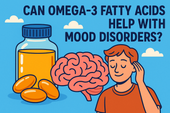
Can Omega-3 Fatty Acids Help with Mood Disorders?
Omega-3 fatty acids do more than support heart health — they can help balance mood, reduce depression, and calm anxiety. Discover how EPA and DHA nourish your brain, fight inflammation, and support emotional well-being from within. 🌊🧠
-

Vitamin D and Mood: The Sunshine Vitamin for Emotional Balance
Could the key to emotional balance be as simple as a little sunlight? Discover how vitamin D — the sunshine vitamin — influences serotonin, reduces inflammation, and helps you feel more positive and resilient year-round. ☀️💛
-

The Role of Magnesium in Reducing Irritability and Low Mood
Feeling on edge or emotionally drained? Magnesium could be the missing link between your body and your mood. Discover how this essential mineral reduces irritability, balances neurotransmitters, and helps your nervous system find calm again. 🌿✨
-
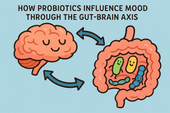
How Probiotics Influence Mood Through the Gut-Brain Axis
Discover how probiotics can do more than support your digestion—they can actually uplift your mood. This article explores the fascinating gut-brain axis and how balancing your gut bacteria through probiotics may help reduce anxiety, improve emotional stability, and support long-term mental well-being. 🌿🧠
-
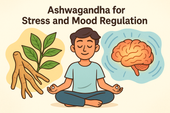
Ashwagandha for Stress and Mood Regulation
Discover how Ashwagandha, the powerful adaptogenic herb 🌿, helps your body manage stress and regulate mood. Learn how it balances cortisol, boosts GABA and serotonin, and supports emotional stability — helping you feel calm, focused, and resilient every day.
-
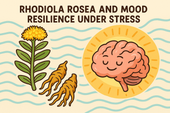
Rhodiola Rosea and Mood Resilience Under Stress
Discover how Rhodiola rosea helps your body adapt to stress 🌿. Learn how this powerful adaptogen balances cortisol, supports serotonin and dopamine, and strengthens emotional resilience — helping you stay calm, focused, and energized under pressure.
-

Chamomile and Lavender: Herbal Calm for Emotional Fluctuations
Discover how chamomile and lavender bring calm to emotional ups and downs 🌿. Learn how these two soothing herbs balance your nervous system, ease anxiety, and support restful sleep — naturally helping you find peace and emotional stability.
-
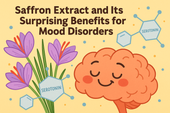
Saffron Extract and Its Surprising Benefits for Mood Disorders
Discover how saffron extract — the golden spice of joy 🌸 — can naturally support mood balance, ease anxiety, and lift mild depression. Learn what science says about its serotonin-boosting power, the ideal dosage, and how this ancient remedy compares to modern antidepressants.
-
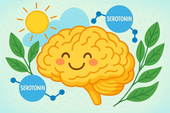
5-HTP and Serotonin: A Natural Path to Lifting Mood
Discover how 5-HTP naturally boosts serotonin 🌞 — the neurotransmitter behind mood, sleep, and emotional balance. Learn how this plant-derived compound supports happiness, reduces anxiety, and improves rest by helping your brain create more serotonin the gentle, natural way.
-
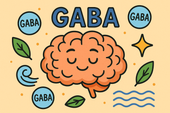
GABA Supplements for Reducing Anxiety and Mood Swings
Discover how GABA supplements can help reduce anxiety and balance mood naturally 🌿. Learn how this calming neurotransmitter works to quiet the mind, ease stress, and improve sleep — plus which nutrients and habits can boost your body’s own GABA production for long-term emotional stability.
-
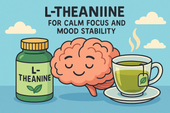
L-Theanine for Calm Focus and Mood Stability
Discover how L-theanine, the calming compound found in green tea 🍵, promotes focus, relaxation, and mood stability. Learn the science behind how it balances neurotransmitters, reduces stress hormones, and enhances clarity — helping you stay centered, calm, and productive without sedation.
-
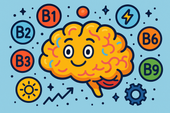
B Vitamins and Brain Chemistry: Supporting Energy and Emotional Balance
Discover how B vitamins power your brain chemistry ⚡. Learn how B6, B9, and B12 support serotonin, dopamine, and energy production — helping boost focus, mood, and emotional balance. From diet to supplements, explore how this vital nutrient group keeps your mind resilient and your energy steady.
-

N-Acetyl Cysteine (NAC) and Mood Disorders: What the Research Says
Learn how N-Acetyl Cysteine (NAC) supports brain health and mood balance 🧠. Discover how this antioxidant helps reduce oxidative stress, regulate glutamate, and improve emotional stability in depression, bipolar disorder, and anxiety — backed by cutting-edge psychiatric research.
-

Supplements for Bipolar Disorder: What May Support Stability
Discover the best supplements for bipolar disorder 🌿 that may support emotional stability and brain health. Learn how nutrients like omega-3s, magnesium, vitamin D, and NAC can help reduce inflammation, balance neurotransmitters, and complement traditional treatment safely.

















































